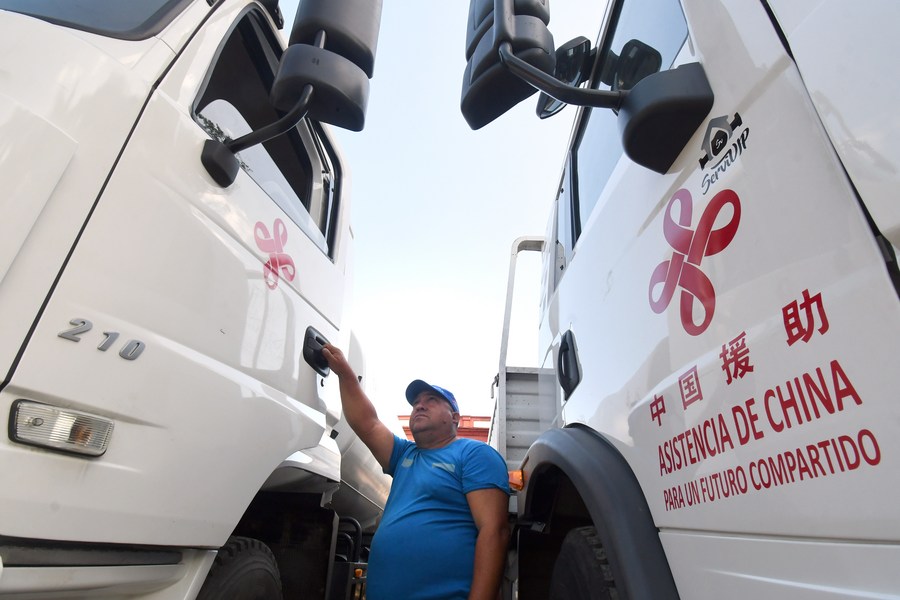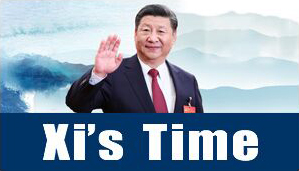
Photo taken on Oct. 30, 2019 shows the modern Chinese-built floating dry dock delivered to Cuba in Havana, Cuba. (Photo by Joaquin Hernandez/Xinhua)
by Xinhua writers Lu Youyi, Wu Xiaoying
CHENGDU/BEIJING, Nov. 5 (Xinhua) -- "I sincerely hope that cooperation between China and Cuba in various fields, including science and technology, will continue to deepen in the new era for the greater benefit of the peoples of both countries," said Chinese President Xi Jinping in his recent reply to a letter from Pedro A. Valdes Sosa, a renowned Cuban scientist.
In his letter to President Xi, the 73-year-old scholar, who has lived and worked in China for many years, presented the achievements of his team in advancing brain science research and neurological technology cooperation in China. He also expressed his willingness to further contribute to strengthening China-Cuba friendship and to expand the practice of the Belt and Road Initiative (BRI) across the world.
Upon receiving Xi's letter, the scientist told Xinhua that he was greatly encouraged and remains committed to working diligently to promote cooperation between Cuba and China to "turn the beautiful vision outlined by President Xi into reality."

This photo taken on Oct. 17, 2023 shows a decoration for the third Belt and Road Forum for International Cooperation near the China National Convention Center in Beijing, capital of China. (Xinhua/Chen Bin)
"AN INNOVATION IN HUMAN HISTORY"
Sosa has closely followed the Group of 77 and China Summit held in the Cuban capital Havana in September and the third Belt and Road Forum for International Cooperation in Beijing in October, saying both events witnessed high-level exchanges and cooperation between China and Latin America.
He said the primary purpose of his letter to President Xi was to convey his admiration and express his unwavering determination and confidence in continuing to participate in China-Cuban cooperation.
In his reply, President Xi emphasized that this year marks the 10th anniversary of his proposal of the BRI. The essential foundation and perspective of this initiative lie in exploring new ways for distant nations and close neighbors to achieve common development, laying the groundwork for a "path of happiness" that benefits all nations and the world.
Sosa said the Belt and Road cooperation represents an "innovation in human history," "no one is as dedicated as President Xi to exerting such extensive efforts to advance the collective development of all countries."

A train made up entirely by Chinese wagons departs from Havana Central Railway Station in Havana, Cuba, July 13, 2019. (Xinhua/Zhu Wanjun)
"IMPORTANT MOMENT IN MY LIFE"
In his letter, President Xi highlighted Sosa's long-standing dedication to strengthening the special friendly relations between Cuba and China, actively promoting scientific research cooperation, and making significant breakthroughs.
Sosa said that receiving President Xi's letter marked one of the three most pivotal moments in his life.
"The first moment is that my parents told me when I was a child that one's greatest mission in life was to serve humanity," he said. The second is when he once received a phone call from leader of the Cuban revolution Fidel Castro encouraging him to diligently work on developing new technologies for diagnosing brain diseases so as to better serve the people of Cuba and Latin America.
"The third significant moment is receiving a letter from President Xi. My parents charted the course for my life, and Castro strengthened my conviction. President Xi has shown me the potential of conducting scientific research for the benefit of humanity on a broader scale through the Belt and Road cooperation," Sosa said.
In his reply, President Xi noted that international scientific and technological cooperation is a prevailing global trend. He emphasized the need for all nations to collectively advance the cause of global peace and development through scientific and technological innovation.
Sosa deeply resonated with this perspective. "Peace and development are the aspirations of scientists. Only by enabling scientists to collaborate and facilitating global communication can we drive human progress," he said.
Since taking his post at the University of Electronic Science and Technology of China, in Chengdu, capital of Sichuan Province, the research team led by Sosa has made a series of achievements in neural circuit information transmission within the brain, brain-computer interaction, and monitoring Parkinson's disease.
Under his leadership, the university has engaged in scientific and technological cooperation with McGill University in Canada and the Cuban Neuroscience Center. The three nations have jointly initiated a project on brain science cooperation to share related data, information, and research outcomes, garnering participation from more than 20 countries and regions to date.

A staff member checks donated equipment from China at Cuba's National Institute of Hydraulic Resources (INRH) in Havana, Cuba, April 18, 2023. (Photo by Joaquin Hernandez/Xinhua)
BRIDGE OVER SEAS AND CONTINENTS
In his letter, President Xi spoke highly of the longstanding friendship forged by the previous generations of leaders from China and Cuba. He noted that this friendship has continued to yield positive outcomes. Since last year, both sides have reached a significant consensus on working together to build a community with a shared future between China and Cuba.
"The deep-rooted traditional friendship between Cuba and China has resulted in fruitful cooperation across various domains. For example, in the healthcare sector, the two nations maintain a close collaboration, with many of China's scientific research achievements being introduced to Cuba for the benefit of the local population," Sosa said.
Deeply rooted in China, Sosa has witnessed China's rapid development, especially its remarkable progress in scientific research capabilities. Along the way, he has cultivated genuine friendships in China. In 2017, Sosa was honored with the Chinese Government Friendship Award. In 2019, he received an invitation to attend the grand National Day celebration ceremony in Beijing.
During his visit to Latin America in 2014, President Xi introduced a new "1+3+6" framework for cooperation between China and Latin America, with scientific and technological innovation as one of its cornerstones. In recent years, the mechanism for scientific and technological innovation cooperation between China and Latin America has seen continuous improvement. Diversified collaboration has injected powerful vitality into building a community with a shared future for China and Latin America.
The Espacio Lejano Station, a joint project by China and Argentina, has played a vital role in missions such as "Chang'e-4" and "Tianwen-1." The Earth resources satellite, developed jointly by China and Brazil, has expanded the avenues for space-related cooperation between the two nations. The establishment of a sustainable food innovation center between China and Latin America has been accelerated.
These examples depict unwavering cooperation between China and Latin America, and the positive results benefiting all people.
Currently, the University of Electronic Science and Technology of China is actively advancing the establishment of a joint laboratory under the BRI, which will serve as a crucial platform for scientific and technological innovation cooperation with Cuba.
"While the laboratory is rooted in cooperation between Cuba and China, it is open to the entire world," Sosa said. ■




